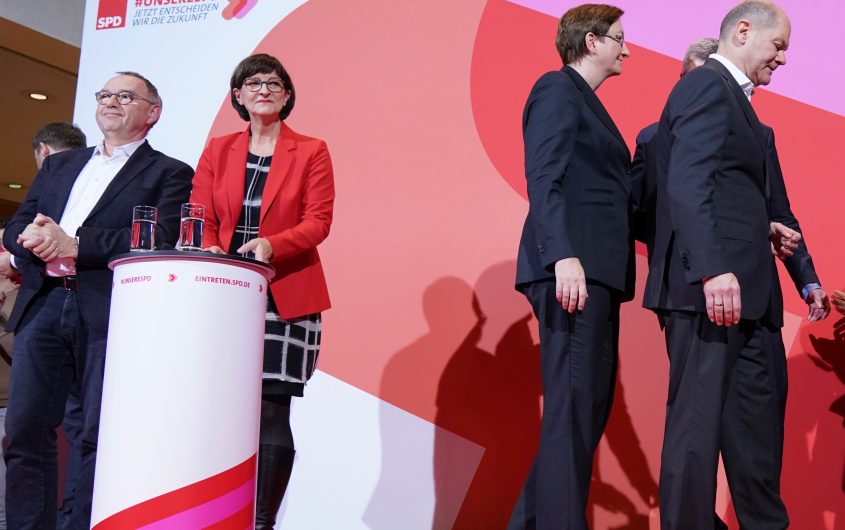
Kay Nietfeld/picture alliance via Getty Images
A Farewell to Power: Germany’s Social Democratic Party After the Election of a New Party Leadership

Dieter Dettke
Georgetown University
Dr. Dieter Dettke is a Non-Resident Fellow at AICGS and Adjunct Professor at Georgetown University.
Dr. Dettke served as the U.S. Representative and Executive Director of the Friedrich Ebert Foundation in Washington from 1985 until 2006 managing a comprehensive program of transatlantic cooperation. In 2006, he joined the German Marshall Fund of the United States as a Transatlantic Fellow and from September 2006 to June 2007, he was a Fellow at the Woodrow Wilson International Center for Scholars. His most recent book is “Germany Says ‘No’: The Iraq War and the Future of German Foreign and Security Policy,” published by theWoodrow Wilson Center Press and The Johns Hopkins University Press, Washington, DC, and Baltimore, 2009.
Dr. Dettke is a foreign and security policy specialist, author and editor of numerous publications on German, European, and U.S. foreign and security issues.
He studied Law and Political Science in Bonn and Berlin, Germany, and Strasbourg, France and was a Fulbright Scholar at the University of Washington in Seattle in 1967/68.
The Social Democratic Party, Germany’s oldest democratic party which emerged from an early German labor movement, survived the challenge of communism after World War I, was forced into exile during the Nazi regime, and rebuilt itself after World War II in a divided Germany. It went on to become the strongest political force by 1972, when it achieved 45.8 percent of the votes: this party is now on its way out of government responsibility. On Saturday, November 30, the SPD members voted for Norbert Walter-Borjans and Saskia Esken as the new leaders of the party. They will succeed Andrea Nahles, who stepped down both as party leader as well as leader of the SPD Parliamentary Group in June of this past year. Walter-Borjans and Esken campaigned for a new beginning for the SPD beyond the present Grand Coalition under the leadership of Angela Merkel. The inescapable logic of this decision is that in reality, the SPD decided against a role in government. This will be the end of the SPD in power for a long time to come.
The Struggle for Leadership
At the beginning of December, at the SPD Party Congress in Berlin, the new leadership duo of Norbert Walter-Borjans, a former Minister of Finance of the State of North-Rhine Westphalia, also known as Nowabo. and Saskia Esken, a left-wing SPD member of the German Bundestag from the State of Baden-Württemberg, will be formally elected without competition to the 15th party presidency since the beginning of the Federal Republic of Germany in 1949. They achieved a 53 percent majority of votes primarily with the support of the JUSOS (the Youth Organization of the SPD) in a membership referendum against their main opponents: the sitting finance minister in Angela Merkel’s cabinet, Olaf Scholz, who campaigned for the party leadership together with Klara Geywitz, an influential SPD politician and former member of the State Parliament of Brandenburg in East Germany. Scholz and Geywitz received 47 percent of the votes with a voter turnout of just 54 percent of party members. This is the result of a lengthy process of leadership selection unheard of in the history of the SPD. The party opened itself up for any party member willing to run for the leadership position as a so-called Doppelspitze (a leadership duo of a male and a female candidate). Had Olaf Scholz and his partner Klara Geywitz won, continuity would have been the main strategy: that is, to seek reform and adjustment of the SPD to the new political and economic environment in Germany and Europe while remaining in power with the CDU/CSU in a Grand Coalition.
An Interregnum of Uncertainty in Germany
The electoral loss of the highly respected SPD finance minister and potential SPD chancellor candidate Olaf Scholz and his partner Klara Geywitz to a second-tier leadership duo with next to zero national experience seems to indicate that Germany is in a more general leadership crisis, an interregnum of uncertainty possibly lasting until election day in 2021, provided there are no new national elections before then. Since the future leadership of the CDU after Angela Merkel leaves the stage is also unresolved, this could possibly be a dangerously long power vacuum in Germany and, by extension, also in Europe at a time of rapid economic, social, political, cultural, and technological change. This situation will also block progress in Europe, where a grand bargain between France and Germany seems to be more important than ever.
Most likely, under the new leadership of Norbert Walter-Borjans and Saskia Esken the SPD will have to pull out of the Grand Coalition, not hastily, but sooner rather than later. They will have to design a new political strategy to stop the painful process of losing election after election on the state (Länder) and local levels both in eastern and western Germany and for a majority in the party, this cannot be done successfully in a Grand Coalition government. There seems to be no end in sight to the horror of shrinking voter support from the heights of power of Social Democracy in the 1970s, with 40 percent or more in national elections, to the loss of votes in some state elections to under 10 percent. In public opinion polls today, the SPD is at 15 percent or less on the national level.
Elected on the basis of a strategy of change and renewal, the new leadership duo will have to design a policy platform of new policy initiatives for the remaining time in office of the Grand Coalition. They will demand in particular stronger environmental policies, higher minimum wages, and new infrastructure investments. This will be included in the mandate they will ask for—and will receive—at the Party Congress in Berlin this December.
The Coming Minority Government Experiment
After the December 6-8 Party Congress in Berlin, it will become difficult for the current team of SPD ministers in Angela Merkel’s cabinet to continue serving as part of the government. Given the political platform the new SPD leadership campaigned on, the SPD Party Congress will most certainly place conditions on the future support of the Grand Coalition and demand changes to the current government’s policy agenda. This will lead to a showdown within the Grand Coalition. Most likely Angela Merkel’s CDU as well her Bavarian sister party, the CSU, will oppose any policy changes. The rank and file of both parties already perceive the Grand Coalition’s existing policy agenda as a burden for the next elections. Conservative leadership will prefer to accept the SPD’s withdrawal from the Grand Coalition rather than agree to additional policy changes. Annegret Kramp-Karrenbauer, the new CDU party leader and Markus Söder, the popular new leader of the Bavarian CSU, already registered their firm position opposing any policy changes and Chancellor Merkel supported their concern in public.
The most likely outcome will be that Angela Merkel will have to govern on the basis of a minority government if the SPD officials, as a result of the decisions made at the SPD Party Congress in December, decide to leave the Grand Coalition government. Such a scenario is quite realistic since the Grand Coalition already passed the 2020 federal budget. The chancellor’s risk of losing crucial votes in the Bundestag in 2020 is therefore rather low. As Wolfgang Schmidt, State Secretary in the finance ministry led by Olaf Scholz pointed out, the need to fill the government positions left by SPD cabinet members would not require a vote in the Bundestag.
As Schmidt also argues, Chancellor Merkel could even dismiss the SPD ministers and their junior ministers in her cabinet if the Party Congress in December would undermine the Grand Coalition. This drastic step was taken by Chancellor Helmut Schmidt in mid-September 1982 when he dismissed the FDP cabinet members shortly before facing a constructive vote of no-confidence that he then lost; Helmut Kohl then became Chancellor of the Federal Republic of Germany. Such a move would be part of the powers of the chancellor. CDU candidates to fill these positions are already waiting in the wings. As Schmidt surmises, Jens Spahn could take over as finance minister and Peter Altmaier, the current Minister of Economic Policy and Energy, could take over the Foreign Office. Inviting the FDP and the Greens to join the CDU/CSU in a new Jamaica Coalition experiment is hardly a realistic assumption less than two years before scheduled new elections. Doing this would also add policy headaches for Chancellor Merkel within her own party.
The only other serious alternative to a Merkel minority government would be new elections after triggering and deliberately losing a vote of confidence that the chancellor would have to request. Such a procedure, considered to be constitutionally questionable by constitutional law experts, would most likely be opposed by a majority of the current members of the German Bundestag.
The Red-Red-Green Power Perspective
While switching from a Grand Coalition to a minority government—as unusual as it is for Germany on the Federal level—appears to be manageable without much disruption, the future trajectory of the Social Democratic Party with the new leadership is much more uncertain. In the future, the SPD will most likely put all bets on Red-Red-Green coalitions in the states as well as on the federal level. However, on the basis of current public opinion polls, such a coalition model does not have a majority of votes. If present voter preferences continue, it is an open question whether the SPD will come out as the strongest party with the right to claim leadership in a Red-Red-Green coalition. In addition, it is quite uncertain whether and under which conditions the other two partners in this particular coalition model would support such a concept. In Thuringia, Die Linke is the strongest party and in charge of the government. The Green Party might well opt for a different coalition model and, as in the state of Hesse, prefer to govern with the CDU in order to boost its centrist appeal. Trying to convince voters to support the SPD on the basis of a coalition strategy that the SPD does not control is a questionable and hardly credible strategy going forward.
Conclusion
If present trends of voter preferences continue, the SPD at the latest in 2021 (if not even sooner) will be out of power on the national level at least for a generation. The party will also lose its strong standing on the state and local levels. Much blame will now be attributed to the neoliberal turn of the SPD under the leadership of Gerhard Schröder. But the blame game and running away from its own successes will not save the party from a future of powerlessness. The problems of the party are deeper than that. The bitter reality is that Social Democracy suffers from its own success story of having achieved many of its original goals of more social justice and lifting people out of poverty. As the class struggle subsided, classic SPD voters moved from underprivileged working classes into the middle class, leaving behind previous concerns in favor of new values and expectations. So far, the successor generation of Willy Brandt and Helmut Schmidt have been unsuccessful in adjusting the programmatic outlook of the party to reflect the new work environment, changing social status, different values, and democratic expectations of German society. Under the conditions of rapid economic, technological, and cultural change, a much broader and less class-oriented milieu of German society has emerged and, consequently, both people’s work and lifestyles have evolved. To adjust to these new developments will require a longer period of time, most likely in opposition rather than in government.








